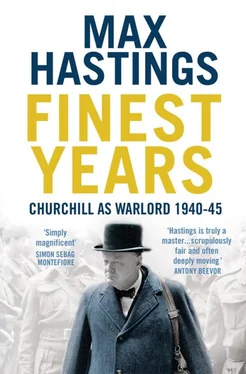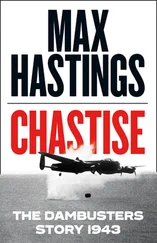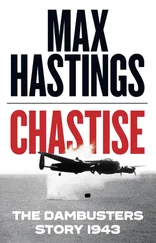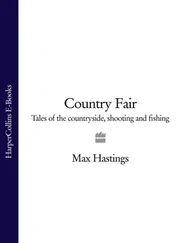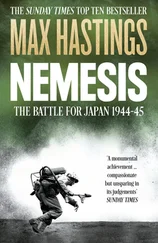When the debate ended the following night, thirty-three Tories voted against their own party on the Adjournment Motion, and a further sixty abstained. Though Chamberlain retained a parliamentary majority, it was plain that his Conservative government had lost the nation’s confidence. This was not merely the consequence of the Norway campaign, but because through eight fumbling months it had exposed its lack of stomach for war. An all-party coalition was indispensable. Labour would not serve under Chamberlain. Winston Churchill became Britain’s prime minister following a meeting between himself, Chamberlain, Foreign Secretary Lord Halifax and Tory chief whip David Margesson on the afternoon of 9 May 1940, at which Halifax declared his own unsuitability for the post, as a member of the House of Lords who would be obliged to delegate direction of the war to Churchill in the Commons. In truth, some expedient could have been adopted to allow the Foreign Secretary to return to the Commons. But Halifax possessed sufficient self-knowledge to recognise that no more than Neville Chamberlain did he possess the stuff of a war leader.
While much of the ruling class disliked and mistrusted the new premier, he was the overwhelming choice of the British people. With remarkably sure instinct, they perceived that if they must wage war, the leadership of a warrior was needed. David Reynolds has observed that when the Gallipoli campaign failed in 1915, many people wished to blame Churchill—then, as in 1940, First Lord of the Admiralty—while after Norway nobody did. ‘It was a marvel,’ Churchill wrote in an unpublished draft of his war memoirs, ‘I really do not know how—I survived and maintained my position in public esteem while all the blame was thrown on poor Mr Chamberlain.’ He may also have perceived his own good fortune that he had not achieved the highest office in earlier years, or even in the earlier months of the war. Had he done so, it is likely that by May 1940 his country would have tired of the excesses which he would surely have committed, while being no more capable than Chamberlain of stemming the tide of fate on the Continent. Back in 1935, Stanley Baldwin explained to a friend his unwillingness to appoint Churchill to his own cabinet: ‘If there is going to be a war—and who can say there is not—we must keep him fresh to be our war Prime Minister.’ Baldwin’s tone was jocular and patronising, yet there proved to be something in what he said.
In May 1940 only generals and admirals knew the extent of Churchill’s responsibility for Britain’s ill-starred Scandinavian deployments. Nonetheless the familiar view, that he was sole architect of disaster, seems overstated. Had British troops been better trained, motivated and led, they would have made a better showing against Hitler’s forces, which repeatedly worsted them in Norway while often inferior in numbers. The British Army’s failure reflected decades of neglect, together with institutional weaknesses that would influence the fortunes of British arms through the years which followed. These were symbolically attested by a colonel who noticed among officers’ baggage being landed at Namsos on the central Norwegian coast ‘several fishing rods and many sporting guns’. No German officer would have gone to war with such frivolous accoutrements.
Now Halifax wrote disdainfully to a friend: ‘I don’t think WSC will be a very good PM though…the country will think he gives them a fillip.’ The Foreign Secretary told his junior minister R.A. Butler, when they discussed his own refusal to offer himself for the premiership: ‘It’s all a great pity. You know my reasons, it’s no use discussing that—but the gangsters will shortly be in complete control.’ Humbler folk disagreed. Lancashire housewife Nella Last wrote in her diary on 11 May: ‘If I had to spend my whole life with a man, I’d choose Mr Chamberlain, but I think I would sooner have Mr Churchill if there was a storm and I was shipwrecked. He has a funny face, like a bulldog living in our street who has done more to drive out unwanted dogs and cats…than all the complaints of householders.’ London correspondent Mollie Panter-Downes told New Yorker readers: ‘Events are moving so fast that England acquired a new Premier almost absent-mindedly…It’s paradoxical but true that the British, for all their suspicious dislike of brilliance, are beginning to think they’d be safer with a bit of dynamite around.’ National Labour MP Harold Nicolson, a poor politician but a fine journalist and diarist, wrote in the Spectator of Churchill’s ‘Elizabethan zest for life…His wit…rises high in the air like some strong fountain, flashing in every sunbeam, and renewing itself with ever-increasing jets and gusts of image and association.’
Though Churchill’s appointment was made by the King on the advice of Chamberlain, rather than following any elective process, popular acclaim bore him to the premiership—and to the role as Minister of Defence which he also appropriated. Tory MP Leo Amery was among those sceptical that Churchill could play so many parts: ‘How Winston thinks that he can be Prime Minister, co-ordinator of defence and leader of the House all at once, is puzzling, and confirms my belief that he really means the present arrangement to be temporary. Certainly no one can coordinate defence properly who is not prepared to be active head of the three Chiefs of Staff and in fact directly responsible for plans.’ Critics were still expressing dismay about Churchill’s joint role as national leader and defence minister three years later. Yet this was prompted not by mere personal conceit, but by dismay at the shocking lack of coordination between the services which characterised the Norway campaign. And posterity perceives, as did he himself at the time, that beyond his own eagerness to run Britain’s war machine, there was no other political or military figure to whom delegation of such power would have been appropriate.
In one of the most famous and moving passages of his memoirs, Churchill declared himself on 10 May ‘conscious of a profound sense of relief. At last I had the authority to give directions over the whole scene. I felt as if I were walking with destiny, and that all my past life had been but a preparation for this hour and this trial.’ He thrilled to his own ascent to Britain’s leadership. Perhaps he allowed himself a twitch of satisfaction that he could at last with impunity smoke cigars through cabinet meetings, a habit that had annoyed his predecessor. If, however, he cherished a belief that it would be in his gift to shape strategy, events immediately disabused him.
At dawn on 10 May, a few hours before Churchill was summoned to Buckingham Palace, Hitler’s armies stormed across the frontiers of neutral Holland, Belgium and Luxembourg. Captain David Strangeways, serving with the British Expeditionary Force near Lille just inside the French border, bridled at the impertinence of an orderly room clerk who rushed into the quarters where he lay abed shouting: ‘David, sir, David!’ Then the officer realised that the clerk was passing the order for Operation David , the BEF’s advance from the fortified line which it had held since the previous autumn, deep into Belgium to meet the advancing Germans. Though the Belgians had declared themselves neutrals since 1936, Allied war planning felt obliged to anticipate an imperative requirement to offer them aid if Germany violated their territory.
David perfectly fulfilled Hitler’s predictions and wishes. On 10 May the British, together with the French First and Seventh Armies, hastened to abandon laboriously prepared defensive positions. They mounted their trucks and armoured vehicles, then set off in long columns eastward towards the proffered ‘matador’s cloak’, in Liddell Hart’s phrase, which the Germans flourished before them in Belgium. Further south in the Ardennes forest, Panzer columns thrashed forward to launch one of the war’s great surprises, a thrust at the centre of the Allied line, left inexcusably weak by the deployments of the Allied supreme commander, France’s General Maurice Gamelin. Guderian’s and Reinhardt’s tanks, racing for the Meuse, easily brushed aside French cavalry posturing in their path. Luftwaffe paratroops and glider-borne forces burst upon the Dutch and Belgian frontier fortresses. Stukas and Messerschmitts poured bombs and machine-gun fire upon bewildered formations of four armies.
Читать дальше
